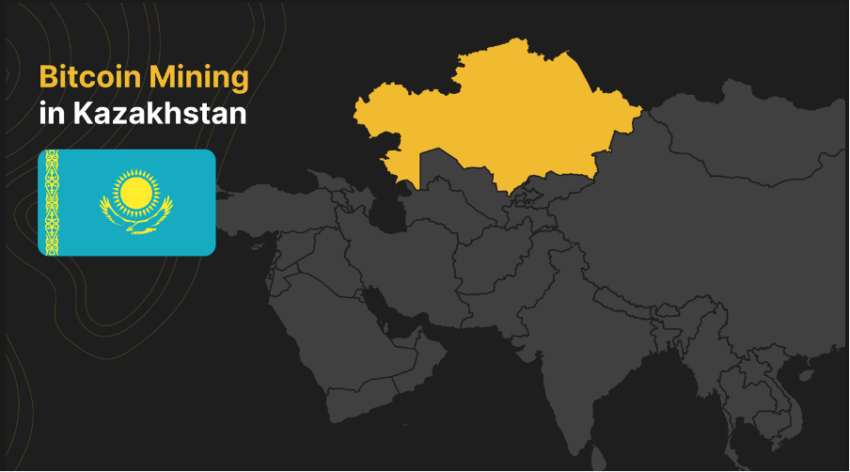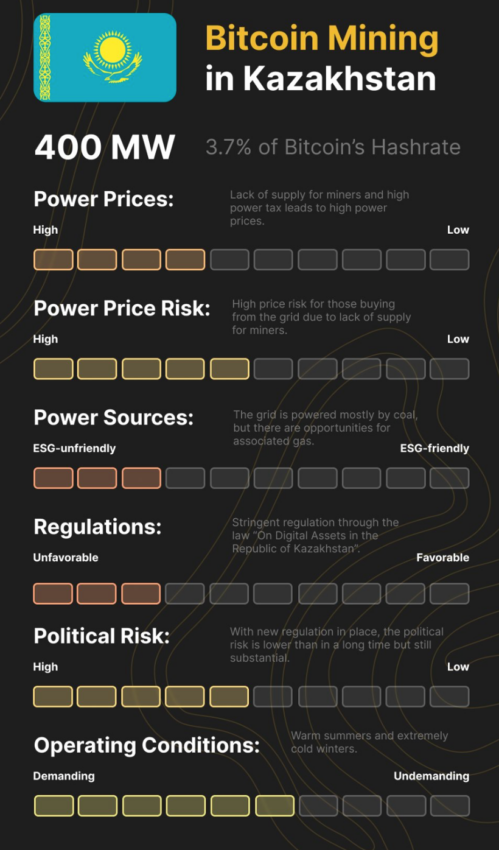Bitcoin mining in Kazakhstan sees ups and downs

The rapid growth of the Bitcoin mining industry in Kazakhstan led to unforeseen consequences that strained the country’s energy infrastructure. Miners have needed help finding a balance with local regulations.
Kazakhstan’s rapid rise in the global Bitcoin mining industry was fueled by its abundant energy resources and favorable regulatory environment. The country quickly rose to become the second largest producer of Bitcoin in the world in 2021, only behind China.
However, this rapid growth also led to some unexpected consequences. The country’s energy infrastructure had to be equipped to handle the huge increase in demand from Bitcoin miners. As a result, the country began to experience frequent blackouts and power rationing. The situation reached a critical point in early 2022 when the Kazakh government introduced a nationwide power rationing program. The government said the measure was necessary to prevent the country’s energy infrastructure from collapsing.
Bitcoin mining in Kazakhstan
Bitcoin mining is an energy-intensive process that requires huge amounts of electricity to power the computers that perform complex calculations to generate new bitcoins. In Kazakhstan, Bitcoin miners were attracted by the country’s abundant natural resources, including coal and natural gas, which could be used to generate cheap electricity.
In fact, just in 2021, Bitcoin mining capacity exploded from 500 MW in January to a peak of 1,500 MW in October. Its share of the global hashrate rose from 6% to 18%. “Kazakhstan had suddenly become a Bitcoin mining superpower,” added a May 2 report from Hashrate Index.

However, the sudden influx of Bitcoin mining strained the country’s power grid. Many operations were located in remote areas that were not connected to the primary power grid. These operations relied on their generators to power their mining rigs, putting even more strain on the country’s energy resources.
As a result, the country’s share of the global hash rate dropped from a peak of 18% in October 2021 to just 4% in May 2023. Meanwhile, its mining capacity was 400MW, showing a 73.33% drop, as shown in the graph above.
The government tried to ease the strain on the energy grid by taxing Bitcoin mining. However, this move met with opposition from the industry, which argued that the tax would make it difficult for them to compete with other countries.
Understand the rise
Kazakhstan’s booming Bitcoin mining industry in 2020-2021 was fueled by several factors that created a perfect storm for the industry to thrive.

First, Kazakhstan has abundant natural resources, including coal and natural gas, which can be used to generate cheap electricity. This was a big draw for miners, as mining Bitcoin is an energy-intensive process that requires huge amounts of electricity.
Specifically, the Kazakh government limits electricity prices to between $0.02 and $0.03 per kWh. These price caps gave Kazakh miners access to globally competitive electricity prices.
Second, there was a massive demand for hosting services from Bitcoin mining companies as the industry grew globally. Kazakhstan had a favorable geographical location, with its proximity to China and Europe making it an attractive location for hosting. Therefore, the region witnessed a huge influx of capital from Western miners. Mainly looking for quick and cheap machine deployments during a bull market.
The China ban plays a role
Third, access to cheap Chinese mining machinery also played a role in the growth of the industry in Kazakhstan. China has been a dominant player in the global Bitcoin mining industry.
However, the ban ended such operations as the exodus of miners to other regions began. Many of the machines used in Kazakhstan were imported from China at a lower price than other countries. Additionally, unable to sell to the Chinese market anymore, the big rig manufacturers, especially Canaan, began to target the Kazakh market more aggressively.
Fourth, Kazakhstan had a relatively loose regulatory environment and tax breaks for the industry, making it an attractive location for Bitcoin miners. The government was keen to attract investment and create new jobs, and the bitcoin mining industry was seen as a way to achieve these goals.
These factors together create the perfect breeding ground for the industry. However, the industry’s rapid growth also led to unforeseen consequences.
From highs to massive lows
The situation in Kazakhstan highlights the challenges that arise when a country becomes too dependent on a single industry. In this case, the rapid growth of the Bitcoin mining industry led to an over-reliance on energy resources and a failure to invest adequately in the country’s energy infrastructure.
As a result, Kazakhstan’s Soviet-era electricity system had difficulty accommodating the sudden 1.5 GW surge in demand from miners. Due to the heavy load, the southern parts of the region suffered power cuts.
In addition, regulatory battles with the government led to hiccups in the operation. Kazakh grid operator KEGOC began cutting power supplies to Bitcoin miners in the southern part of the country. Things went from bad to worse amid the power rationing program imposed by the government. This had a major impact on the mining industry. Many operations were forced to shut down or reduce production. It all led to a drop in the country’s global ranking for Bitcoin production.
In addition, the government implemented a set of rules and regulations to centralize or control the operations. In 2019, the government announced that Bitcoin miners would be subject to a tax on their profits, calculated based on the amount of electricity used to mine bitcoin.
Recently, the government announced plans to introduce new crypto regulations to curb tax fraud and illegal business operations. Kazakh President Kassym-Jomart Tokayev signed a bill allowing miners to tap into the national grid only when there is a surplus. The country will distribute this profit based on a tender process, but only to licensed miners. This Act entered into force on 1 April 2023.
Where are things?
To reduce the possibility of tax evasion, crypto miners in Kazakhstan will be forced to sell at least 75% of their earnings via registered crypto exchanges. This rule, which aims to collect “information about the income of digital miners and digital mining pools for tax purposes,” will be effective from January 1, 2024 to January 1, 2025.
The Kazakh Bitcoin mining industry is at a crossroads following the latest regulation. Either the law will provide the stable regulatory environment needed for the industry to grow sustainably, or its strict rules will kill off what is left of the industry.

What is certain is that Kazakhstan has a power shortage that needs to be addressed before the country’s Bitcoin mining industry can return to its former gigawatt glory.
Jaran Mellerud, a lead researcher at Hashrate Index, mean:
“The only way I see the Bitcoin mining industry in Kazakhstan growing significantly in the coming years is if miners develop their own production capacity. This could come from various sources, but the biggest potential is related to gas, wind and solar.”
Takeaways
The experience of Kazakhstan should serve as a warning to other countries considering entering the Bitcoin mining industry. While the potential rewards can be great, there are also serious risks involved. Governments must weigh the benefits and risks of allowing Bitcoin mining in their countries and ensure they have the infrastructure to handle the industry’s demands.
In addition to the country’s energy grid strain, Bitcoin mining has environmental implications. The process of generating new bitcoins requires huge amounts of energy, which contributes to climate change. This has led to some countries, such as China, cracking down on Bitcoin mining to reduce their carbon footprint.
In response to the power rationing program in Kazakhstan, some Bitcoin mining operations have begun to explore alternative energy sources. For example, some mining operations use solar energy to generate electricity. However, this transition to renewable energy sources is still in the early stages and is not widespread.
Disclaimer
In accordance with Trust Project guidelines, this feature article presents the opinions and perspectives of industry experts or individuals. BeInCrypto is dedicated to transparent reporting, but the views expressed in this article do not necessarily reflect the views of BeInCrypto or its employees. Readers should verify information independently and consult with a professional before making decisions based on this content.
























